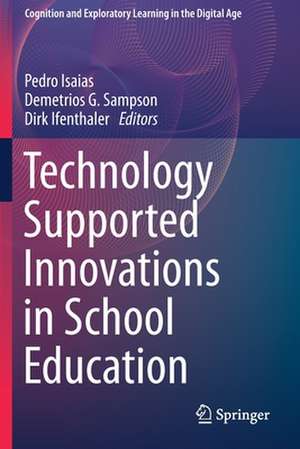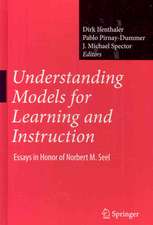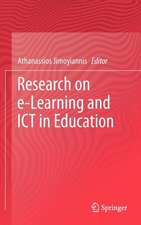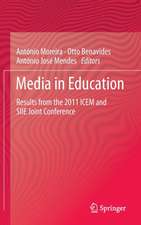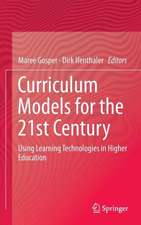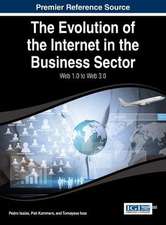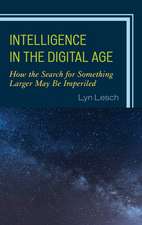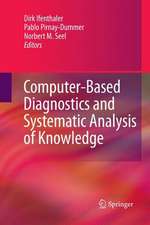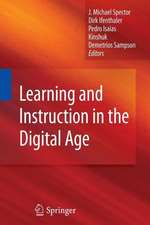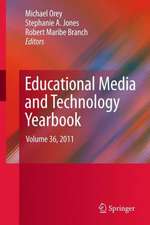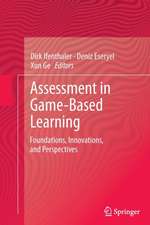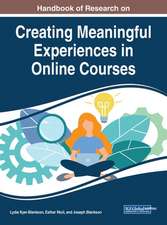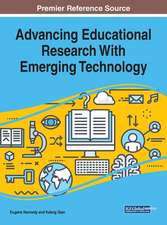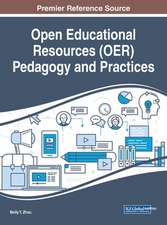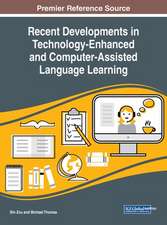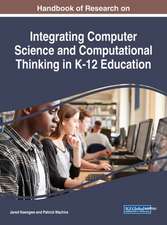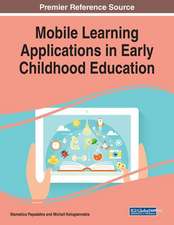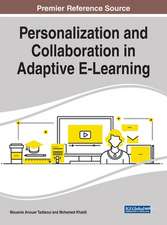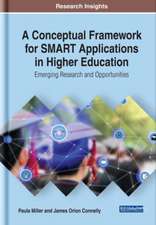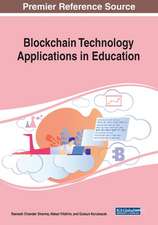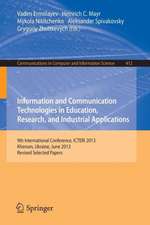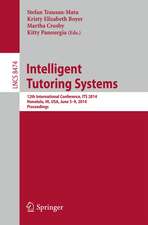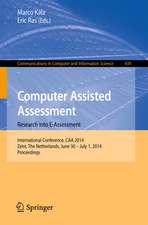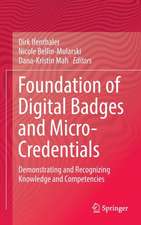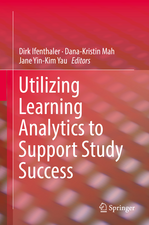Technology Supported Innovations in School Education: Cognition and Exploratory Learning in the Digital Age
Editat de Pedro Isaias, Demetrios G. Sampson, Dirk Ifenthaleren Limba Engleză Paperback – 11 oct 2021
| Toate formatele și edițiile | Preț | Express |
|---|---|---|
| Paperback (1) | 638.11 lei 6-8 săpt. | |
| Springer International Publishing – 11 oct 2021 | 638.11 lei 6-8 săpt. | |
| Hardback (1) | 644.30 lei 6-8 săpt. | |
| Springer International Publishing – 10 oct 2020 | 644.30 lei 6-8 săpt. |
Preț: 638.11 lei
Preț vechi: 750.72 lei
-15% Nou
Puncte Express: 957
Preț estimativ în valută:
122.12€ • 132.60$ • 102.58£
122.12€ • 132.60$ • 102.58£
Carte tipărită la comandă
Livrare economică 23 aprilie-07 mai
Preluare comenzi: 021 569.72.76
Specificații
ISBN-13: 9783030481964
ISBN-10: 3030481964
Ilustrații: XXVI, 219 p. 49 illus., 34 illus. in color.
Dimensiuni: 155 x 235 mm
Greutate: 0.35 kg
Ediția:1st ed. 2020
Editura: Springer International Publishing
Colecția Springer
Seria Cognition and Exploratory Learning in the Digital Age
Locul publicării:Cham, Switzerland
ISBN-10: 3030481964
Ilustrații: XXVI, 219 p. 49 illus., 34 illus. in color.
Dimensiuni: 155 x 235 mm
Greutate: 0.35 kg
Ediția:1st ed. 2020
Editura: Springer International Publishing
Colecția Springer
Seria Cognition and Exploratory Learning in the Digital Age
Locul publicării:Cham, Switzerland
Cuprins
Part I - Exploring the use of Digital Technologies in School Education.- Chapter 1 – Digital ethnicity: Social belonging in the internet age.- Chapter 2 - The use of virtual reality at lower secondary schools.- Chapter 3 - Language and electronic medium skills development through autonomous and ideological practices.- Chapter 4 – Technology enhanced learning of motions based on a clustering approach.- Chapter 5- Comparing face-to-face to online instruction in secondary education - Findings of a repetitive factoral experiment.- Part II - Technology Supported STEM School Education.- Chapter 6 – Coding and computational thinking - using Arduino to acquire problem solving skills.- Chapter 7 – Learning through a “route planner” Human-computer information retrieval for automatic assessment.- Chapter 8 - Orchestrating outdoor location-based learning activities.- Part III- Teachers' Professional Development.- Chapter 9– Online professionallearning communities for developing teachers’ digital competences.- Chapter 10 – Experiences of multimodal teaching through a serious game: meanings, practices and discourses.- Chapter 11 – The development of teacher leadership inventory in Malaysian educational context.
Notă biografică
Pedro Isaias is an Associate Professor at the Information Systems & Technology Management School of The University of New South Wales (UNSW – Sydney), Australia. Previously he was an Associate Professor at The University of Queensland, Brisbane, Australia. Before moving to Australia, he was also an Associate Professor at Universidade Aberta (Portuguese Open University) in Lisbon, Portugal, where he was responsible for several courses and director of the master's degree program in Management / MBA. He was also director of the master's degree program in Electronic Commerce and Internet for 10 years. Associate Professor Pedro Isaias holds a PhD in Information Management (in the specialty of information and decision systems) from the New University of Lisbon. Author of several books, book chapters, papers and research reports, all in the information systems area, he has headed several conferences and workshops within the mentioned area. He has also been responsible for the scientific coordination of several EU funded research projects. He is also a member of the editorial board of several journals and program committee member of several conferences and workshops. In the past 20 years, he has developed expertise in Learning Technologies and e-Learning, as part of his roles. Currently, he conducts research activity related to MIS in general and more specifically Learning Technologies, Data Analytics, Business Intelligence, Digital Transformation, e-Business and WWW related areas.
Demetrios Sampson is a Professor of Learning Technologies at the University of Piraeus, Greece. He is the co-author of 350 articles in scientific books, journals, and conferences, and the editor of 17 books, 35 special issues in academic journals and 40 international conference proceedings. He has received 10 times Best Paper Award in International Conferences on Learning Technologies. He has been a Keynote/Invited Speaker in 90 International/National Conferences. He has been director, principal investigator and/or research consultant in 70 Research and Innovation projects with external funding at the range of 16 Million€. He has supervised 155 honors and postgraduate students to successful completion. He has developed and delivers the first Massive Online Open Course (MOOC) on the use of Educational Data Analytics by School Teachers (Analytics for the Classroom Teacher), offered by the edX platform (a Harvard and MIT led global initiative) which has attracted more than 16.000 participants from 160 countries around the world since October 2016. He is the recipient of the IEEE Computer Society Distinguished Service Award (July 2012) and named a Golden Core Member of IEEE Computer Society in recognition of his contribution to the field of Learning Technologies. He is also the recipient of the Golden Nikola Tesla Chain Award of the International Society for Engineering Pedagogy (IGIP) for "International outstanding achievements in the field of Engineering Pedagogy" (September 2018).
Dirk Ifenthaler is Professor and Chair of Learning Design and Technology at University of Mannheim Germany and UNESCO Deputy Chair of Data Science in Higher Education Learning and Teaching at Curtin University Australia. His previous roles include Professor and Director Centre for Research in Digital Learning at Deakin University Australia Manager of Applied Research and Learning Analytics at Open Universities Australia and Professor for Applied Teaching and Learning Research at the University of Potsdam Germany. He was a 2012 Fulbright Scholar-in-Residence at the Jeannine Rainbolt College of Education at the University of Oklahoma USA. Dirk’s research focuses on the intersection of cognitive psychology educational technology data analytics and organisational learning. His research outcomes include numerous co-authored books book series book chapters journal articles and international conference papers as well as successful grant funding in Australia Germany and USA. He is the Editor-in-Chief of the Technology Knowledge and Learning Senior Editor of Journal of Applied Research in Higher Education and Deputy Editor-in-Chief of International Journal of Learning Analytics and Artificial Intelligence for Education.
Textul de pe ultima copertă
This volume provides a comprehensive and contemporary depiction of the swift evolution of learning technologies and the innovations that derive from their deployment in school education. It comprises cases studies, research focused on emergent technologies and experiments with existing tools in a wide range of scenarios. The studies included in this volume explore the conceptual and practical aspects of technologies that are used to support learning, with a multidisciplinary approach that encompasses all levels of education. The three sections of this volume emphasise the use of digital technologies from the viewpoint of different fields of expertise, explore multiple educational settings where technology was implemented to support the various stages of the learning process, and underline strategies, tools and technologies that play a crucial role in the professional development of teachers.
Caracteristici
Includes case studies and features emergent technologies and experiments with existing tools in varied scenarios, pedagogical approaches to the use of technology, and conceptual studies discussing the impact of learning technologies Offers a comprehensive and multi-disciplinary depiction of current issues, comprising chapters from different fields and disciplines from various leading scholars Focuses both on technological and pedagogical aspects of learning in the digital age Features a variety of learning technologies appealing to all levels of education
